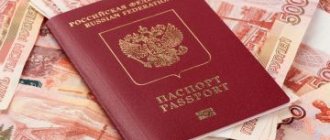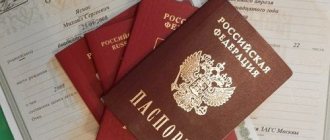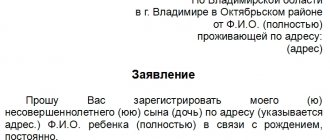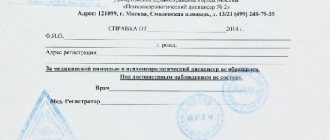According to the law of the Russian Federation, every citizen must have registration at the place of residence.
This also applies to minor children.
From the very birth of a child, parents are obliged to register him in their living space.
But sometimes this becomes impossible due to certain circumstances.
Then the question often arises: is it possible to register a minor with his grandmother?
…
Legislative acts
Issues of registration and deregistration in Russia are regulated by one of the basic legislative acts - the Civil Code.
According to Article 20 of the Civil Code of the Russian Federation:
- the child must live in the living space where his parents are registered;
- if the child does not have parents - in the guardian’s area;
- if the mother is registered at one address, and the father at another, then their son or daughter can live in one apartment or in another, but only if both parents have given their consent to this;
- when both the mother and father do not have registration, according to the Civil Code, the child can be registered with the grandmother. But there are many nuances here.
Can a grandmother register an adult grandson in her privatized apartment?
If the apartment is privatized, then she can give it to her grandson. Or make a will. But in the event of the death of the grandmother, in addition to the heir under the will, a disabled heir may receive a share according to the law. Let’s say her son or daughter is retired.
If the grandmother wants to transfer the apartment to her grandson, then she can give it to him. To do this, it is necessary to draw up a gift agreement and register the transfer of ownership in Rosreestr. Another option that is possible is to bequeath the apartment to your grandson. In this case, inheritance by law does not occur, but inheritance by will occurs. True, in this case there may be faces. having the right to an obligatory share in the inheritance (Article 1149 of the Civil Code of the Russian Federation), who inherit regardless of the contents of the will.
This is interesting: How to Solve the Issue with Registration When Moving to Another City for Permanent Residence
Restrictions on registration
If a close relative is the sole owner of the apartment, then it is enough to conclude an agreement with him that one of the parents is registered in the living space together with the child. This is a mandatory condition, since the Civil Code obliges parents (at least one) to be registered with the child . But this only applies to children under fourteen years of age.
If a minor citizen has already turned fourteen and has expressed a desire to register in his grandmother’s apartment, he can do this without his parents.
IMPORTANT! If there are several homeowners, then everything is a little more complicated, since the consent of all owners will be required.
Another way to register a child in the grandmother’s apartment without registering the parents is for the grandmother to register as a guardian.
How to register a wife, husband or child in a privatized apartment
Everyone understands the difference between privatized and municipal housing. Therefore, citizens are wondering how to register for a privatized apartment, and are sure that this operation is fraught with bureaucratic delays, but in reality, registration can be done quickly and easily. Let's look at this procedure in detail. Let's look at this procedure in detail.
What rights does registration of a non-owner in a privatized apartment give?
Owners of privatized housing, considering the prospect of registration in their living space by a stranger - not a family member, often fear that their rights will be infringed upon after the registration of a new tenant.
However, in accordance with housing and civil legislation, the registration of any person in any object does not affect the property rights of the owners.
For example, a husband and wife privatized an apartment. After some time, at the request of their daughter, they registered their son-in-law as her. The son-in-law becomes one of the residents and, according to the Housing Code, is equal to family members.
But the son-in-law does not influence the property rights of his mother-in-law and father-in-law - they can sell the apartment, donate it, exchange it, deprivatize it, and they do not need to take his opinion into account.
The son-in-law cannot dispose of this housing in any way; he has no property rights to it.
Permanent registration
A registered citizen receives the right to use the object - that is, he can live in it. Even after the sale of the apartment or change of owners, the tenant retains his right of use as long as he is registered for this apartment.
The downside of registration is financial obligations - if utility bills are calculated not according to meters, but according to standards, then adding a new tenant will increase their amount. In this case, the tenant must pay for his part of the “utilities” - even if the calculation is made using measuring instruments.
By the way, refusal to pay utility bills is grounds for a person’s forced discharge through the court.
The key point in registration issues is when did the tenant register? If he registered in a municipal apartment before privatization and then refused to participate in privatization, then he receives the right to lifelong use of this object - it will not be easy to evict such a person. Read more about how to deregister a registered person from a privatized apartment here.
Registration in municipal housing
The peculiarity of social rented housing is that its owner is the municipality, where you need to go and apply to register in such an apartment.
To register an unauthorized person, adult tenants must obtain written permission from the municipality - usually the housing department. For example, in order to register a person in an apartment in Moscow, you need to contact the Property Management Department, where the tenant submits an application for registration of other persons in the rented apartment.
The social apartment where a new resident is registered must have sufficient space for all residents to live in accordance with the sanitary and technical standards of the municipality. If the standards are met, the department will issue a written permit.
If the person who wants to register is a close relative, then the consent of the municipality is not required. Close relatives are children, parents, spouse, brother and sister. If you are interested in how to register in a non-privatized apartment without consent, go here.
What is needed to register a person in a social rental apartment?:
- Form 6 applications from those wishing to register;
- Written consent of the municipality - when it is necessary to register an outsider;
- Passports of employers and those registering;
- Social tenancy order or agreement;
- Departure sheets - when the check-out was made in advance (remember that in order not to receive a fine, you must comply with the registration period at the new place of residence).
How long will it take to register? The procedure takes from 1 week to 1 month.
https://www.youtube.com/watch?v=Zw8JvuM4A8I
If registration occurred after the procedure of denationalization of property, then the right will not be for life.
Temporary registration
Temporary registration gives the same rights as permanent registration, but they end with the expiration of the registration period.
For those who are afraid to register strangers in their living space, temporary registration is the best option.
The real risk is the right of registered parents to register in a privatized apartment without ownership rights for their son or daughter under 14 years of age - without consent and even without notifying the owner. It is possible to discharge a child through the court, but a number of strict conditions must be met.
How to register a person in privatized residential property?
The workload of citizens determines the search for the fastest and most convenient ways to receive services. How to quickly register, can this be done remotely, what documents need to be collected and which department to contact?
Registration rules
From the moment you move to a new place, you must submit information to the passport office for registration at the updated address within 7 days. If you ignore this requirement, a fine of 1,500-2,500 rubles may be imposed on the violator.
In 2020, the functions of the passport office are assigned to the Ministry of Internal Affairs of Russia, and specifically to its regional divisions of the Department of Internal Affairs of the Ministry of Internal Affairs of Russia - the Directorate for Migration Issues, where you need to go to register in an apartment.
How to register a relative - son, husband, wife, granddaughter, newborn child?
How to register in an apartment with the owner? The answer depends on the type of housing - private property or social rent.
It doesn’t matter whether the owner is a relative or a stranger, registration in a privatized or municipal apartment will be done the same way.
Children under 14 years of age are registered at the address of one of the parents without taking into account the consent or disagreement of the homeowner.
If a minor granddaughter or grandson wants to register with their grandparents, they can do this with the permission of their parents.
Registration in a privatized apartment without ownership rights
First you need to register at your old address. Of course, you can immediately submit documents for re-registration under a new one, but then the process may take 2-4 weeks.
Extract is carried out like this:
- Visit to the passport office at the place of old registration;
- Filling out the bottom part of the application form No. 6 for deregistration (if the address of the future home is known at the time of deregistration, you must indicate it in the application; if the place of residence is not determined, you can write down any address);
- Submitting an application and original passport to the passport office employee (it is possible that the employee will discharge the person on the same day - during the time they are in the building, but the procedure may take 3 working days);
- On the appointed day, come to the department, pick up your passport and departure sheet (this sheet is necessary for further registration in the new apartment).
To register through the passport office you need:
- Visiting the passport office for registration together with the owner/owners . If there are minors among the owners, they are not required to come.
- Verification of documents . The employee will check what documents are available for registration in the apartment and whether their list needs to be supplemented, and will make sure that the owners and those registering are present. If everything is in order, the specialist will take the passports of those registering and set a day to appear for the results.
- Registration at a new place of residence or stay will be carried out within 1-2 weeks . You can pick up passports with stamps, and for children under 14 years old - certificates of registration at the new address.
In the case of registration in someone else's apartment, the procedure is slightly different from registration in your own home.
To register in the owner's apartment you need:
- an application from someone who wants to register in Form 6;
- written consent of adult owners to register in their housing.
If among those registering there is a newborn or children under 14 years of age, parents write applications for them.
Depending on the regulations of each territorial department of the Ministry of Internal Affairs of the Ministry of Internal Affairs, the procedure for registration in the owner’s apartment is individual - sometimes:
- all owners write a general consent,
- One general statement is required from those registering,
- both parties sign on one single form.
Documentation
List of documents required at the passport office for permanent or temporary registration in the owner’s apartment:
- Owner's passports;
- Title documents of owners - certificate or extract of registration of ownership, agreement on acquisition, donation, etc.;
- Passports of those registering, if there are children among them - birth certificates;
- Departure sheets, if a statement was previously made;
- Statements;
- Written consent of the owners;
The rights of a non-owner registered in an apartment do not prevent the owners from owning, using and disposing of their property. At any time they can sell, donate, or bequeath the apartment.
If the acquiring party does not want to receive an apartment with tenants, and the tenants refuse to check out, then they can always be forcibly deregistered through the court.
It is relevant to use the website of the Government of Russia - State Services for registration in an apartment.
Registration through State Services
To use the portal, you must register an account there.
How to do it:
- Login to the site;
- Click on the “Registration” button;
- Enter basic data; for this you will need a passport and SNILS certificate; It is also advisable to indicate your phone number and email;
- Confirm your account - click on automatic document verification at the Russian Ministry of Internal Affairs, or go through manual confirmation - visit any MFC.
After assigning the status “Verified Account” to your account, you can order the service.
Registration at the place of residence or stay is carried out in this section www.gosuslugi.ru/10050. Here you can register or sign out the account owner himself, as well as register or sign out another person.
In any case, the application must be submitted by the owner - an application for registration is received from his account. And if a parent needs to register their child under 14 years of age, for example, often a mother or father wants to register a newborn at their address, then they simply submit an application on their own behalf, indicating the child as the one being registered, and the parent does not need to have property rights.
Instructions for registration through State Services:
- Select registration at the place of residence or stay (permanent or temporary registration);
- A window with information about the service will open - study the details of the provision and click on the button on the right “Get a service”;
- Next, fill out the application.
How to apply:
- The first point provides for a choice - who registers, the applicant himself or he registers another person.
- Personal data is automatically transferred from your account. It is enough to check their correctness.
- Passport data is also generated automatically by the system. You can enter your address in the place of birth field, but this is not required.
- Information about your registration is entered. Usually the address is also transferred from the profile data. Compliance with passport details is important.
- In this paragraph you need to indicate the address at which this registration will be carried out. If you register your child with yourself, then write your registration address again.
- Next, the document or grounds for registration are indicated. For example, if this is not your apartment, you can indicate “Other” and give an explanation like “the apartment belongs to my relative.”
- Information about citizenship is indicated.
- Information about activities - work or study. You need to choose the most appropriate answer options for your situation.
- You need to select a branch of the passport office. Select the department that is convenient for you to visit and agree to data processing and click on “Submit”.
Registration does not affect the property rights of owners.
The application is sent to the department of the Ministry of Internal Affairs of the Ministry of Internal Affairs selected by the user and is queued for processing. When the turn comes, one of the passport office employees accepts the application and sets a day for appearance.
On the appointed day, the applicant brings documents. If he is not the owner, then the owner must come with him or - after clarifying the possibility of this method - there must be a notarized power of attorney/application.
Sometimes it is difficult for citizens to independently understand the operation of the portal. Then you can contact any MFC - there you can both register in an apartment and receive many other government services and advice. The MFC will submit the application through State Services instead of the applicant.
How to temporarily register a person in a privatized apartment?
The procedure is carried out in the same way as in the case of permanent registration - only the type of registration “at the place of residence” and the period are indicated.
A lawyer talks about the nuances of registering a person in privatized housing in this video:
Registration, whether permanent or temporary, means that the registered person has the right to live in this living space, but he cannot manage or dispose of the object. Registration of an apartment does not affect ownership in any way and is carried out according to the standard procedure.
Why you need an apartment appraisal for a mortgage, read our article here.
For additional information on this issue, please refer to the “Registration” section here.
Source: https://napravah.com/kvartira/propiska/v-privatizirovannuyu.html
How to register a child with his grandmother?
What documents are needed?
In order to register a minor at the place of residence of the grandmother, you will need a package of documents including:
- Birth certificate of the person being registered.
- Passports or other documents confirming the identity of the parents.
- A written statement containing a request to register a minor in the grandmother's apartment. It must be written by one of the parents.
- Written consent of the second parent.
- An agreement fixing the registration of the mother or father together with the child. This is a regular agreement on the free use of residential premises, but it must involve the registration of a representative along with a minor citizen.
- A document confirming the owner's right to own the apartment.
ATTENTION! Each case is individual and sometimes additional paperwork may be required. Therefore, in the process of creating a package of documents, you should take into account all the specifics of your personal situation.
Registration stages
When all the papers have been collected, further actions can be divided into five successive stages.
So, you will need:
- Contact the local authorities involved in registering citizens (house management, Federal Migration Service).
- Find out the full list of documents that will be required and collect the missing ones. It is at this stage that it will become clear whether any additional documents are needed in addition to those listed above.
- Conclude all necessary agreements and have documents certified by a notary.
- At the passport office, write an application for registration at the place of residence (form number 6).
- Obtain official permission to register the child in the form of a stamp on the birth certificate.
Without parents
It is possible to register a child without at least one parent only if he is already fourteen years old.
At this age, the law allows a citizen to enter into an agreement on the free use of living space. Until the age of fourteen, the law obliges a child to live with his parents.
There is only one way to register a child under fourteen years of age without a parent - if the grandmother takes guardianship of her grandson , since the law allows a child to live with a guardian if he does not have parents.
Algorithm for married parents
Registering a baby is simple and does not require a large number of documents. If you prepare all the necessary papers, you can complete everything in one day.
Let's go to the registry office
At the first stage, it is necessary to obtain a child’s birth certificate from the district registry office, which can be issued by one of the parents. Documents provided: Russian passport, marriage certificate, certificate from the maternity hospital indicating the date, time and place of birth, as well as the weight and gender of the child. If within a month the parents have not chosen a name or issued a birth certificate for the baby, they may be issued a warning.
Now to the passport office or housing department
With the received birth certificate, you must contact the passport office of the housing department (HOA) to register the child.
It must be taken into account: if registration is issued within a month after birth, then the presence of one mother with the application is necessary. After this period, you may need a certificate from the father’s place of residence about the registered residents, which indicates that the child is not registered with him. This option is for the case if the child’s father is registered at a different address.
At the passport office, the parent where the child is registered must fill out an application form for the child’s registration (form No. 6). The forms are issued by the passport office staff. A sample of how to fill it out can be found on the information board.
The following documents must be submitted along with the application:
- Birth certificate.
- Passports of both parents.
- Marriage certificate.
- If a newborn is registered in an apartment, an extract from the house register about all those registered will be required. You can take it there. If a child is registered in a private home, then a house register is required, which is always in the hands of the owners.
- A certificate from the personal account where the newborn is registered. It is issued at the accounting department of the passport office.
- If a child is registered with his father, he must present the notarized consent of the mother.
All documents are submitted on a one-stop-shop basis. Along with the originals, you must also prepare copies of documents.
After submitting the documents, the passport office employees collect the certificate and passport. If a child is registered in a private home, then the corresponding entry will be in the house register. The registration period is usually one to seven days. There, parents can make a note in their passport about the birth of a child in the “children” column. On the appointed day, you can pick up your child’s passports and birth certificate.
Registration in a municipal apartment
Registration in a non-privatized apartment has some peculiarities.
What documents are needed?
In addition to the standard package of documents, the following will be required:
- If there are still minor citizens registered in the living space, it is necessary to obtain written consent from them to register a new tenant. This may cause problems if you plan to register several grandchildren at once.
- Papers that can confirm the family relationship between the owner of the property and the minor citizen whom she is going to register.
- Extract from the house register.
Procedure
The stages of registration in municipal housing are no different from a similar procedure with privatized housing (if you do not take into account the receipt of additional documents). But a municipal apartment has some features and nuances compared to a privatized one.
Differences from registration in a privatized apartment
The main feature of non-privatized living space is the absence of a single owner.
If the owner can register anyone in privatized housing at will, then in municipal housing other residents may oppose this.
Another significant difference is the need to document the right to register a minor in municipal housing .
It can take quite a lot of time to collect the necessary papers.
Is it possible to register a person in a non-privatized apartment: we answer questions
Housing law > Registration and registration > Is it possible to register a person in a non-privatized apartment - let’s figure it out together
Despite the fact that most residential premises in our country are privately owned, there is still housing that is not privatized, and therefore does not legally belong to those who live in it registered and resides. Based on this, some people have questions about how a person can be registered in a non-privatized apartment.
What are the legislative acts regulating the registration of citizens at their place of residence? Photo No. 1
After changes occurred in the current legislation and a new Constitution was adopted, citizens had the opportunity to become full owners of their residential premises, since in the Soviet Union they did not have such rights.
Legally, in those days all apartments belonged to the state, and the persons who lived in them and were registered actually rented such living quarters.
The regulations that govern this type of legal relationship are as follows.
- The Constitution of our state. This is the fundamental Law that guarantees every person the right to be the owner of immovable residential property.
- Housing Code. This set of laws gives the concept of residential premises, and also establishes a legal mechanism for the process of transferring non-privatized housing into private ownership.
- Subordinate legal documents that describe the rules and also establish a list of papers that will be needed for privatization, as well as registration and deregistration of people from residential premises.
It is important to understand that the rules for registering citizens in non-privatized housing are the same for all regions, since they are regulated by by-laws of the government.
Features of registration, who can be registered
Who can be registered in a non-privatized apartment? Photo No. 2
When answering these two questions, there are several important factors to consider.
- Non-privatized housing does not belong to citizens, and they live in it under the right of so-called social rent. It follows from this that the owners of the apartments are municipal authorities, which enter into rental agreements with citizens for such a residential property, with the right of registration in it for the main tenant (with whom the agreement is signed) and members of his family.
- In order to register a citizen in municipal housing, the desire of all residents, as well as special government bodies that are in charge of such residential premises, is required.
Based on this, in order to register a person in a non-privatized apartment, it is necessary to collect the following list of documents:
- an application from the person with whom the rental agreement for residential premises was concluded, submitted to the territorial migration service office (passport office), as well as to the authorized official of the municipality;
- an application from a person who wants to register, which is submitted to the passport office;
- special statements from people who live in such residential premises that they do not object and agree with the registration of another person in the apartment.
To register a person in a non-privatized apartment, first of all, enlist the support of neighbors. Photo No. 3
After all these documents have been collected, a registration stamp will be affixed to the person’s passport, and he has every right to live in a non-privatized apartment.
Now let's look at the question of who can be registered.
- Relatives. These include citizens who are related to the main tenant. This includes spouses, children, brothers and sisters, as well as distant relatives. The degree of relationship is confirmed by relevant documents.
- Outsiders. These can be friends, acquaintances, or citizens who enter into a sublease agreement with the main tenant, that is, they rent residential premises for living under the contract.
Minor family members (children) have a special status. Immediately after their birth, they have the right to registration in non-privatized housing, and the consent of other residents is not necessary for this.
The exception is those children who were born elsewhere, and the main tenant wants to re-register them in a municipal apartment. Here, the consent of all residents (registered) will be required in any case.
It is important to know that the guardianship and trusteeship authorities are always on the side of minor children. Therefore, if other family members do not want to give consent to such actions, then this can be done by court decision.
Registration procedure and rights of residents
What rights do those registered in a non-privatized apartment have? Photo No. 4
The procedure for registering citizens will be as follows.
- The main tenant collects applications from all residents and registered residents of the apartment, stating that they agree to have one more person registered in the residential premises. Such applications must be accompanied by copies of the passports of those from whom such an application has been taken away.
- After this, together with the person who will be registered, the tenant is sent to the housing office or another housing organization that is in charge of this housing, where documents confirming the consent of other residents for registration are submitted to the authorized person.
- The authorized person checks all this and gives consent, after which he takes an application from the tenant and the person who will be registered about their consent.
- Next, with these applications, you need to go to the passport office, whose officials will register the new person and make the appropriate entries in the house register.
After all these actions, the new person is considered registered and has the right to live in the apartment.
It is important to know that if officials refuse to take such actions, their actions can be appealed in court.
Residents' rights, nuances regarding registration of new people
Rights of residents and neighbors of non-privatized premises. Photo No. 5
Due to the fact that the status of non-privatized residential premises is special, the residents who live in it have the following rights:
- refuse consent to registration in the apartment of a new person;
- apply to the court with a claim for the forced deportation of persons who are registered in the apartment, but have not lived in it for a long time, or are violating the rules for using the residential premises.
Now we need to talk about the nuances of such actions. In principle, there are not many of them. Regarding minors, it was discussed above.
The next nuance is that the disagreement of other residents with registration can only be resolved in court. In some cases, this is the deregistration of non-residents from whom consent cannot be taken away, and in others, this is forcing officials to carry out registration in a residential premises, forcibly.
Expert lawyer's opinion:
In order to register a person in a municipal apartment, the consent of not only everyone registered in a given living space, but also the municipality is required.
In accordance with housing legislation, the municipal authority must look at the area of the residential property in which it is planned to register one more person. Each region has an approved minimum living space per resident.
If the area of the apartment and the number of people already registered do not allow anyone else to register, then the municipal authorities will refuse registration.
The exception is minor children and spouses. This category of citizens is registered regardless of the wishes of other users and the owner.
Registration of other persons in a non-privatized apartment is not difficult if there is the consent of all residents and registered persons, as well as authorized municipal bodies that have such premises on their books. In other cases, you need to go to court.
A brief overview of the procedure for registering in an apartment is given in the video:
Select it and press Ctrl+Enter to let us know.
30 Jan 2020 kasjanenko 139
Source: https://pravozhil.com/propiska/propisat-cheloveka-v-kvartiru.html
Mother's rights
If the child is registered in the grandmother's apartment, the mother's rights do not change. Guardianship and registration are two different things, so you should not be afraid that the minor’s place of residence will somehow affect the mother’s legal rights. Also, the registration of a son or daughter does not give the mother the right to live at this address . Such rights can only be given by a contract concluded with the owner.
Registration of a minor citizen is not the easiest procedure, even if it is expected to live together with a close relative - a grandmother. But it is quite feasible. So, if there is such a need to register a child with the grandmother, the law provides for all the mandatory procedures and rights of the parties.
Third party consent
The consent of third parties (other family members, tenants) is not required if the mother is registered at the child’s registered address.
If the mother is not registered at her place of residence, she must obtain consent to the child registration procedure from the owner. To do this, she needs to collect a package of documents:
- certificate of ownership;
- application for owner's consent;
- passport of the owner of the property (copy);
- arrival and departure sheets of persons registered at the specified address.
If the mother lives with her parents, then their consent to the registration of her grandson (granddaughter) is not required. It is worth noting that if the second parent does not consent to the child’s registration, then such actions will be illegal.
Registration registration procedure
How to register a grandson with his grandmother in a privatized apartment?
If she has formalized guardianship or registered one of the parents of this child with her, then in order to register her grandson, she will have to follow the following procedure.
For questions regarding registration of citizens, please contact:
- migration departments of the Ministry of Internal Affairs;
- Federal Migration Service;
- passport offices;
- in some regions - MFC.
You should also request from the employees of the above institutions a list of documentation necessary to successfully complete the registration of the child.
Typically the following documents are required:
- Identity cards of the father and mother of the child.
- Birth certificate of a grandson, who must be registered at the residence address of his grandmother.
- Application from one of the parents with a request to register the child at the place of residence of the relative.
- An agreement on the free use of housing space where they wish to register a minor. This agreement is concluded between the owner of the property and the parent who will be registered together with the child. Instead of this document, the owner can submit a statement of his consent to the provision of an apartment.
- Official consent for the child’s registration from the second parent (optional, but desirable).
- For privatized housing, you must provide a document that confirms ownership, as well as a copy of your personal financial account.
This list of documents is only approximate and is by no means final. When submitting an application to the above government agencies, you can check their full list.
Employees must separately review your specific case and determine the list of required documentation.
The grandmother must be personally present during the registration procedure itself and not object to it.
If the grandmother has become the official guardian of her grandson, then additional documents will not need to be submitted to the regulatory authorities.
If housing is municipal
Can a grandmother register her granddaughter in a municipal apartment?
Yes, for this you will need to provide an additional package of the following documents:
- an extract from the house register;
- a certificate from the registry office confirming the relationship;
- social rental agreement;
- a document that declares the consent of all those registered;
- an extract from the personal account (issued at the EIRC).
It is noteworthy that the decision to register a minor child does not depend on the number of square meters in the grandmother’s apartment.
Moreover, a child registered in a municipal apartment will be able to participate in the privatization of living space and, along with other residents, become one of the owners of the property.
Grandmother should pay special attention to this nuance if she is a social renter.







